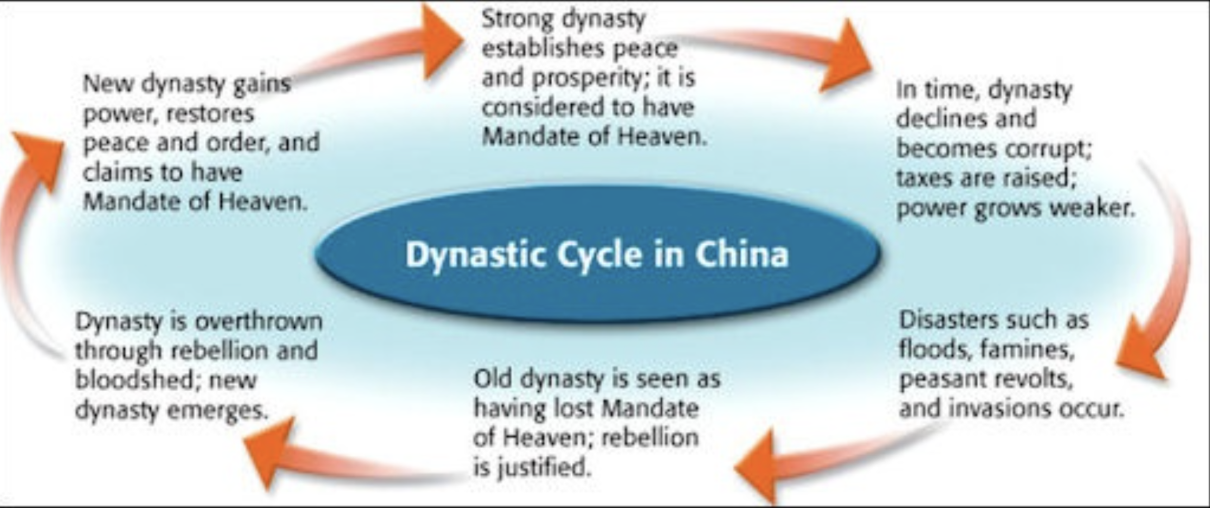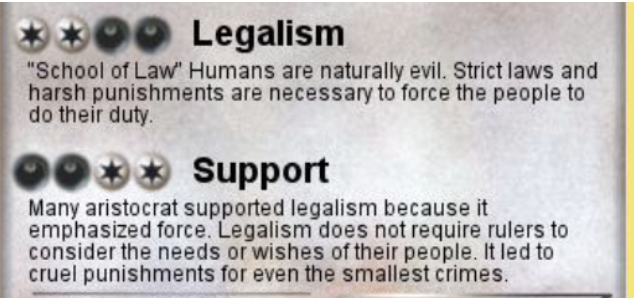Unit V Quiz- Chinese Philosophies + Mongols
4.3(3)
Card Sorting
1/18
Earn XP
Description and Tags
study guys !!!!!
Last updated 3:30 PM on 2/10/23
Name | Mastery | Learn | Test | Matching | Spaced | Call with Kai |
|---|
No analytics yet
Send a link to your students to track their progress
19 Terms
1
New cards
loess
a fertile deposit of windblown soil
2
New cards
oracle bone
one of the animal bones or tortoise shells used by ancient Chinese priests to communicate with the gods
3
New cards
dynasty
a series of rulers from a single family
4
New cards
Feudalism
a political system in which nobles are granted the use of lands that legally belong to their ruler, in exchange for their loyalty, military service, and protection of the people who live on the land
5
New cards
filial piety
respect shown by children for their parents and elders
6
New cards
bureaucracy
a system of departments and agencies formed to carry out the work of government
7
New cards
autocracy
a government in which the ruler has unlimited power and uses it in an arbitrary manner
8
New cards
movable type
blocks of metal or wood, each bearing a single character, that can be arranged to make up a page for printing
9
New cards
pastoralist
a member of a nomadic group that herds domesticated animals
10
New cards
clan
a group of people descended from a common ancestor
11
New cards
tribute
a payment made by a weaker power to a stronger power to obtain an assurance of peace and security
12
New cards
Steppe
dry, grass-covered plain
13
New cards
Mandate of Heaven
Zhou Dynasty: Developed idea of Mandate of Heaven
* belief that if the king was a good ruler, he had the support of tian (heaven) but if he ruled poorly, he lost that support and would be overthrown
* Practiced feudalism: king gave nobles their land and in return they gave king a portion of their crop and promised to provide soldiers in times of war
* belief that if the king was a good ruler, he had the support of tian (heaven) but if he ruled poorly, he lost that support and would be overthrown
* Practiced feudalism: king gave nobles their land and in return they gave king a portion of their crop and promised to provide soldiers in times of war

14
New cards
**Confucianism**
Confucius (551 to 479 BCE)
1. Most influential East Asian philosopher
2. As Zhou Dynasty fell, sought ways to restore peace and harmony to China
3. Focused on ethics and politics, not religion
4. After his death, teachings were collected in the Analects
5. Golden Rule: "Do not impose on others what you do not wish for yourself."
6. Stressed filial piety (respect shown by children for their parents and elders)
1. Most influential East Asian philosopher
2. As Zhou Dynasty fell, sought ways to restore peace and harmony to China
3. Focused on ethics and politics, not religion
4. After his death, teachings were collected in the Analects
5. Golden Rule: "Do not impose on others what you do not wish for yourself."
6. Stressed filial piety (respect shown by children for their parents and elders)
15
New cards
Five Relationships of Confucianism
a. Ruler to subject
b. Father to son
c. Husband to wife
d. Older brother to younger brother
e. Elder to younger
Superior was obligated to look after inferior while inferior owed obedience and respect to superior
b. Father to son
c. Husband to wife
d. Older brother to younger brother
e. Elder to younger
Superior was obligated to look after inferior while inferior owed obedience and respect to superior
16
New cards
**Daoism**
1. Founded by Laozi (“Old Master”) c. 500 BCE (if he existed)
2. Simplicity, balance and a oneness with nature emphasized
3. Yin and yang symbolizes this balance
a. Yin was cold, dark, female, and submissive
b. Yang was warm, light, male, and aggressive
c. to be at peace, needed a balance of both
4. Teachings found in Dao De Jing (Tao Te Ching)
5. The goal of life for a Daoist is to cultivate a mystical relationship
6. All types of Daoism have in common the quest for harmony with the universe
7. They emphasize the individual’s and the group’s need for unity through mysticism, magic, and ceremony
8. array of gods who are administrators of the universe, of which they are a part
9. Daoist are able to strengthen the life force within themselves
17
New cards
**Legalism**
1. Founded by Han Feizi c. 200 BCE
2. Core beliefs
a. people naturally evil/selfish
b. need strong ruler who demanded absolute obedience
c. laws should be strict with harsh punishments and rewards
\-There was a weak government with many warring states, the people wanted a more controlled government which led to legalism
\-Legalism is based on the viewpoint that in order for a ruler to maintain order in society, people must obey a set of strict laws and those in authority (the rulers and government officials). Legalist philosophers thus created a system of punishment and reward for certain behaviors.
\-famous achievement is the Great Wall of China
\-fell out during late Qin dynasty and early Han dynasty

18
New cards
**The Mongols (pt. 1)**
\-Mongols would protect trade routes
A. Genghis Khan (GK)
1. Mongols were nomads north of China
2. c. 1200, GK united the Mongols and conquered the largest land empire in history
3. Keys to GK’s success:
a. great military organizer and strategist
b. cruelty (cities knew that if they didn’t surrender, they’d be slaughtered)
c. Mongols’ skill on horseback
B. After GK
4. After GK dies in 1227, sons and grandsons continue to expand empire
5. By 1260, empire divided into four khanates ruled by GK’s descendents
6. Mongol rulers often adopted customs/cultures of conquered people
(ex: two khanates became Muslim)
A. Genghis Khan (GK)
1. Mongols were nomads north of China
2. c. 1200, GK united the Mongols and conquered the largest land empire in history
3. Keys to GK’s success:
a. great military organizer and strategist
b. cruelty (cities knew that if they didn’t surrender, they’d be slaughtered)
c. Mongols’ skill on horseback
B. After GK
4. After GK dies in 1227, sons and grandsons continue to expand empire
5. By 1260, empire divided into four khanates ruled by GK’s descendents
6. Mongol rulers often adopted customs/cultures of conquered people
(ex: two khanates became Muslim)
19
New cards
The Mongols (pt. 2)
1. Pax Mongolica (AKA Mongol Peace): Mongols undisputed control of trade routes like Silk Roads allow trade and cultural diffusion to thrive C. Yuan Dynasty (1279-1368)
2. Founded by Kublai Khan, GK’s grandson who conquered China, becoming first foreigner to rule whole country
3. Gave up life in the steppe and lived as a Chinese emperor
4. Moved capital to Beijing
5. Twice failed to invade Japan
6. Was considered successful emperor despite not being Chinese
7. After his death, descendents fought for power and were eventually replaced by the Ming Dynasty